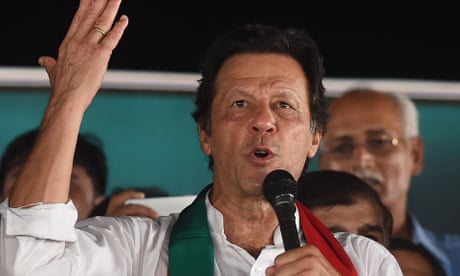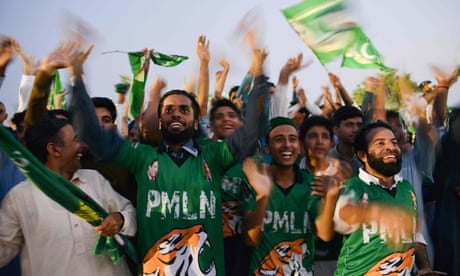Any new government lacking honest democratic credentials will be ill-equipped to confront the country’s challenges

Supporters of Imran Khan at a rally in Multan. Photograph: Ss Mirza/AFP/Getty Images
It seems all but impossible to discuss this week’s national elections in Pakistan without resorting to cricketing metaphors. That’s because the candidate who is widely tipped to win, Imran Khan, is famous less for his political acumen than for his captaincy of the Pakistan team that won the Cricket World Cup in 1992. In British terms, this is the equivalent of the late, much-missed Bobby Moore running for prime minister.
Thus, in well-spun media reports from the campaign trail, Khan’s party, Pakistan Tehreek-e-Insaf (PTI), is said to be poised to hit the opposition for six. Khan’s rival, the jailed former prime minister Nawaz Sharif, is stumped for an answer. And Sharif’s party, the Pakistan Muslim League-Nawaz (PML-N), is appealing to the umpire against alleged ball-tampering by the “establishment”, meaning the army.
It seems all but impossible to discuss this week’s national elections in Pakistan without resorting to cricketing metaphors. That’s because the candidate who is widely tipped to win, Imran Khan, is famous less for his political acumen than for his captaincy of the Pakistan team that won the Cricket World Cup in 1992. In British terms, this is the equivalent of the late, much-missed Bobby Moore running for prime minister.
Thus, in well-spun media reports from the campaign trail, Khan’s party, Pakistan Tehreek-e-Insaf (PTI), is said to be poised to hit the opposition for six. Khan’s rival, the jailed former prime minister Nawaz Sharif, is stumped for an answer. And Sharif’s party, the Pakistan Muslim League-Nawaz (PML-N), is appealing to the umpire against alleged ball-tampering by the “establishment”, meaning the army.

Imran Khan near victory in Pakistan election but some ask if he is playing fair
All well and good, but it does not take a spoilsport to point out the future of Pakistan’s democracy is not a game. The stakes are high in a youthful country of 200m, where many still live in grinding poverty. Although the economy expanded by nearly 6% in the year to June, the current account deficit is rising fast, partly due to currency devaluations. Economists say another IMF bailout may be unavoidable.
Pakistan’s next government also faces stiff challenges from hardline Islamist parties, which execrate the country’s “blasphemous”, western-educated, landed, secular elites and from violent extremists. Running for office in Pakistan can be a hazardous affair, as Benazir Bhutto’s assassination in 2007 demonstrated. The current campaign has been marred by a suicide bombing in Balochistan that killed 149 people.
Then there are wider, strategic concerns relating to war-torn Afghanistan, where Pakistan’s intelligence services have a history of meddling, and to India, a bigger, nuclear-armed and more successful competitor. Angered by what he claimed was Islamabad’s covert support for terrorism, Donald Trump vowed to slash US aid earlier this year. But that may only have enhanced China’s influence as a lender, development partner and supposed PML-N backer.

Pakistan elections: who is standing and what is at stake?
Khan’s cynical wooing of the religious parties (which earned him the nickname “Taliban Khan”), his anti-American rants and his election stance as an anti-corruption, populist champion of change, notwithstanding his privileged Oxbridge upbringing, have left some voters unsure whether he can be trusted. His tweeted suggestion that Sharif was somehow behind the Balochistan bomb was unseemly.
But the PML-N, now led by Nawaz’s brother and fellow Punjabi feudal baron, Shehbaz Sharif, is scarcely a more confidence-inspiring choice. What is vital is that the army, which is said to favour Khan, does not succeed in its alleged efforts to rig the vote and dictate Wednesday’s outcome. Any new government lacking honest democratic credentials will be ill-equipped to confront the country’s challenges.
No comments:
Post a Comment